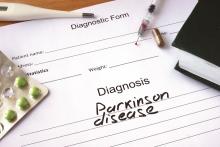User login
Nearly half of advanced Parkinson’s disease patients who receive treatment with subthalamic deep brain stimulation or levodopa-carbidopa intestinal gel infusion are affected by dysautonomia that has significant impacts on their daily lives, according to findings from a cross-sectional study.
“We suggest that identifying and managing autonomic targets, in addition to addressing motor disability, may enhance outcomes” of deep brain stimulation or levodopa-carbidopa intestinal gel therapies for advanced Parkinson’s disease, wrote the research team, led by Aristide Merola, MD, PhD, of the Gardner Family Center for Parkinson’s Disease and Movement Disorders at the University of Cincinnati.
However, individuals with dysautonomia had a nearly threefold greater risk of impairment in activities of daily living than did those without dysautonomia after adjustment for cognitive impairment, age, and motor severity (odds ratio, 2.850; 95% confidence interval, 1.044-10.326; P = .042). There was also a strong correlation between autonomic symptoms and impaired quality of life, particularly for gastrointestinal, urinary, sexual, and cardiovascular domains (Mov Disord. 2017 Mar 3. doi: 10.1002/mds.26970).
Orthostatic hypotension – both symptomatic and asymptomatic – significantly worsened activities of daily living scores. The authors also saw worse cardiovascular impairment in the levodopa-carbidopa intestinal gel group, which they suggested may be due to higher dopaminergic dosage, and worse pupillomotor impairment in the subthalamic deep brain stimulation group, possibly associated with electrical spread to the optic tract.
The researchers noted that the study’s findings “need to be confirmed in prospective clinical trials evaluating patients before and after” treatment with either modality.
The authors had no conflicts of interest to declare.
Nearly half of advanced Parkinson’s disease patients who receive treatment with subthalamic deep brain stimulation or levodopa-carbidopa intestinal gel infusion are affected by dysautonomia that has significant impacts on their daily lives, according to findings from a cross-sectional study.
“We suggest that identifying and managing autonomic targets, in addition to addressing motor disability, may enhance outcomes” of deep brain stimulation or levodopa-carbidopa intestinal gel therapies for advanced Parkinson’s disease, wrote the research team, led by Aristide Merola, MD, PhD, of the Gardner Family Center for Parkinson’s Disease and Movement Disorders at the University of Cincinnati.
However, individuals with dysautonomia had a nearly threefold greater risk of impairment in activities of daily living than did those without dysautonomia after adjustment for cognitive impairment, age, and motor severity (odds ratio, 2.850; 95% confidence interval, 1.044-10.326; P = .042). There was also a strong correlation between autonomic symptoms and impaired quality of life, particularly for gastrointestinal, urinary, sexual, and cardiovascular domains (Mov Disord. 2017 Mar 3. doi: 10.1002/mds.26970).
Orthostatic hypotension – both symptomatic and asymptomatic – significantly worsened activities of daily living scores. The authors also saw worse cardiovascular impairment in the levodopa-carbidopa intestinal gel group, which they suggested may be due to higher dopaminergic dosage, and worse pupillomotor impairment in the subthalamic deep brain stimulation group, possibly associated with electrical spread to the optic tract.
The researchers noted that the study’s findings “need to be confirmed in prospective clinical trials evaluating patients before and after” treatment with either modality.
The authors had no conflicts of interest to declare.
Nearly half of advanced Parkinson’s disease patients who receive treatment with subthalamic deep brain stimulation or levodopa-carbidopa intestinal gel infusion are affected by dysautonomia that has significant impacts on their daily lives, according to findings from a cross-sectional study.
“We suggest that identifying and managing autonomic targets, in addition to addressing motor disability, may enhance outcomes” of deep brain stimulation or levodopa-carbidopa intestinal gel therapies for advanced Parkinson’s disease, wrote the research team, led by Aristide Merola, MD, PhD, of the Gardner Family Center for Parkinson’s Disease and Movement Disorders at the University of Cincinnati.
However, individuals with dysautonomia had a nearly threefold greater risk of impairment in activities of daily living than did those without dysautonomia after adjustment for cognitive impairment, age, and motor severity (odds ratio, 2.850; 95% confidence interval, 1.044-10.326; P = .042). There was also a strong correlation between autonomic symptoms and impaired quality of life, particularly for gastrointestinal, urinary, sexual, and cardiovascular domains (Mov Disord. 2017 Mar 3. doi: 10.1002/mds.26970).
Orthostatic hypotension – both symptomatic and asymptomatic – significantly worsened activities of daily living scores. The authors also saw worse cardiovascular impairment in the levodopa-carbidopa intestinal gel group, which they suggested may be due to higher dopaminergic dosage, and worse pupillomotor impairment in the subthalamic deep brain stimulation group, possibly associated with electrical spread to the optic tract.
The researchers noted that the study’s findings “need to be confirmed in prospective clinical trials evaluating patients before and after” treatment with either modality.
The authors had no conflicts of interest to declare.
FROM MOVEMENT DISORDERS
Key clinical point:
Major finding: Among patients with advanced Parkinson’s disease, 48.3% have dysautonomia, which is associated with a nearly threefold greater risk of impairment in activities of daily living.
Data source: Cross-sectional cohort study in 60 patients with advanced Parkinson’s disease.
Disclosures: The authors had no conflicts of interest to declare.

